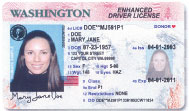12/20/2007
States to Track Drivers Through LicensesA federal program promotes driving license technology that allows the tracking of motorists even when they are not driving.

Electronic monitoring of motorists will soon expand dramatically as states including Arizona, Michigan, Vermont and Washington begin to use radio frequency identification (RFID) chips in drivers' licenses. These electronic chips broadcast the identity of any card holder to any chip-reading sensor within a minimum of thirty feet. The US Department of Homeland Security is promoting the tracking projects as part of its Western Hemisphere Travel Initiative.
"Multiple cards can be read at a distance and simultaneously with vicinity RFID technology, allowing an entire car full of people to be processed at once," a DHS fact sheet on the Passport Card technology explained.
So-called enhanced drivers' licenses are designed to meet the DHS travel document requirements. Enhanced card holders will be allowed to travel across the border without a passport when new regulations take effect in January 2009. The enhanced licenses electronically store the motorist's name, date of birth, height, weight and identity number on the card. RFID readers use the identity number to access additional private information from a department of motor vehicles database.
Although the licenses will initially be offered on a voluntary basis, the National Motorists Association suggests that it will not take long for the program to become mandatory.
"The federal government just incentivizes their proposal so that each state, and by extension its citizens, feel like they have no choice but to go along with their program," the NMA stated today.
The Electronic Privacy Information Center (EPIC) warns that the move is another step toward a national identity card.
"DHS, Arizona, Vermont and Washington are creating these new ID cards in order to change the state driver's license in to a federal border security identification document," the EPIC website explained. "The license is pulled away from its original intent -- to ensure driving competence -- and used as a multi-use federal identification document that could easily be transformed into a national identity card."
Not every state is sold on the idea. The California State Senate voted in April to ban RFID drivers' licenses. The bill passed an Assembly committee by a 9-5 vote in July.


